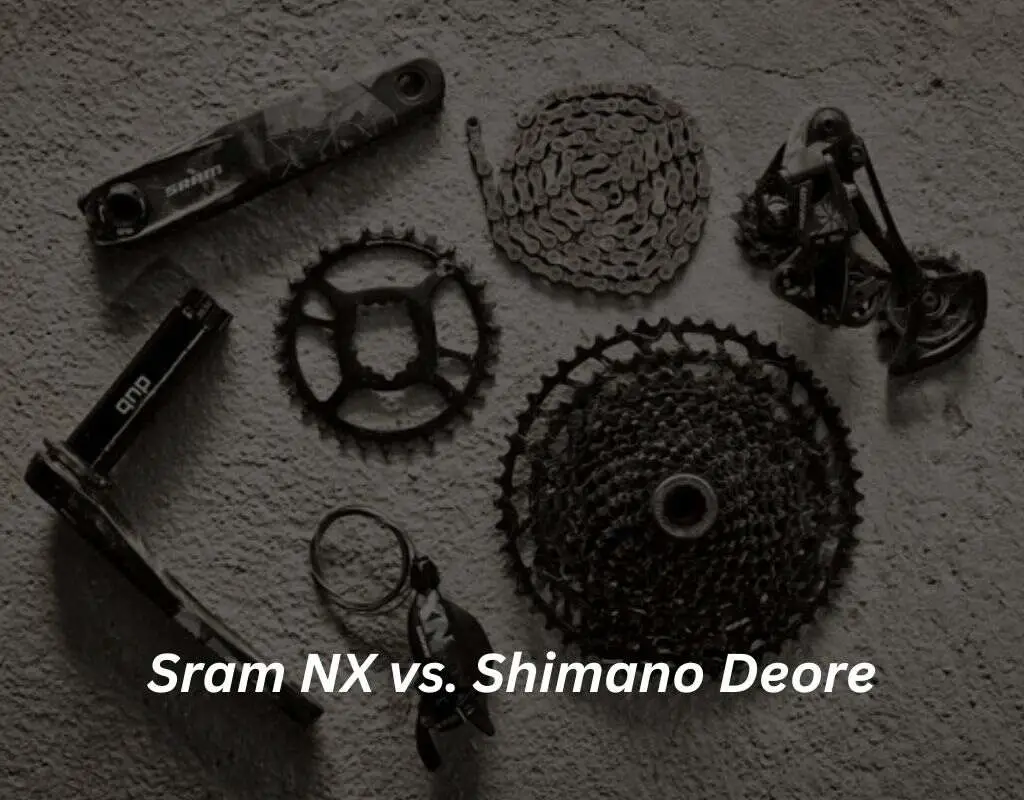
If you are a mountain bike enthusiast, you might have wondered which groupset is better for your bike: SRAM NX or Shimano Deore.
Both are mid-range options that offer reliable performance and durability, but they also have some differences that might affect your riding experience.
Below, we will compare the pros and cons of SRAM NX and Shimano Deore, based on their compatibility, shifting quality, range, weight, assembly, maintenance and cost.
Compatibility
Both SRAM NX and Shimano Deore are compatible with most modern mountain bikes, but they do have some differences in their hub and chain compatibility.
According to Bike Test Reviews , the SRAM NX 1×12 groupset requires a specific SRAM XD driver hub, which might limit your wheel choices. The Shimano Deore 1×11 groupset uses a standard Shimano HG freehub, which is more common and versatile.
The SRAM NX also requires a specific SRAM Eagle chain, which might be more expensive and harder to find.
The Shimano Deore uses a standard Shimano 11-speed chain, which is more affordable and widely available.
The compatibility of both groupsets is not a major issue, but the Shimano Deore might be more convenient and flexible.
Shifting Quality
Shifting quality is one of the most important factors to consider when choosing a groupset. How smooth and reliable is your shifting performance?
Both SRAM NX and Shimano Deore offer excellent shifting quality that can handle any terrain and condition.
However, they also have some differences in their shifting feel and style. According to BikeTips , SRAM groupsets tend to have a more crisp and precise shifting feel, while Shimano groupsets tend to have a more smooth and fluid shifting feel.
The SRAM NX also has a more ergonomic shifter design that allows you to shift multiple gears at once with one thumb push or pull.
The Shimano Deore has a more traditional shifter design that requires you to use both your thumb and index finger to shift gears individually.
The shifting quality of both groupsets is largely subjective and depends on your personal preference and riding style.
Read Also: Shimano Deore vs. SRAM SX Eagle: Which One is better for Mountain Biking?
Range
SRAM NX and Shimano Deore offer a wide range of gears that can cover any terrain and gradient. However, they also have some differences in their gear ratios and cassette sizes.
According to Bike Test Reviews , the SRAM NX 1×12 groupset has a gear range of 500%, with a cassette size of 10-50t. The Shimano Deore 1×11 groupset has a gear range of 454%, with a cassette size of 11-51t.
The SRAM NX has a slightly wider range and a smaller smallest cog, which might give you more speed and efficiency on flat and downhill sections.
The Shimano Deore has a slightly narrower range and a larger largest cog, which might give you more climbing ability and traction on steep and technical sections.
The range of both groupsets is sufficient for most riders, but the SRAM NX might be more suitable for riders who prefer speed and smoothness, while the Shimano Deore might be more suitable for riders who prefer power and control.
Weight
Weight is another factor that many cyclists care about when choosing a groupset.
Both SRAM NX and Shimano Deore are relatively lightweight options that won’t slow you down on the trails, but they do have some minor weight differences.
According to Bike Test Reviews , the SRAM NX 1×12 groupset weighs around 1400g, while the Shimano Deore 1×11 groupset weighs around 1350g. The difference is only 50g, which is negligible in terms of bike weight.
Though, if you are a weight-conscious rider who wants to shave off every gram possible, you might prefer the Shimano Deore over the SRAM NX.
Read Also: Magura vs Shimano Brakes: Compared
Assembly
Both SRAM NX and Shimano Deore are relatively easy to install, as they use cables instead of hydraulics or electronics. However, there might be some differences in the indexing and adjustment process.
According to BikeRadar , some riders find the Shimano Deore easier to index than the SRAM NX, as it has a more intuitive design and less friction in the cables.
The SRAM NX might require more fine-tuning and attention to detail to get the shifting right. However, both groupsets are beginner-friendly and can be installed by anyone with basic tools and skills.
Maintenance
Both SRAM NX and Shimano Deore are relatively easy to maintain, as they use cables instead of hydraulics or electronics. But, they might have some differences in their wear and tear and replacement costs.
According to BikeTips , SRAM groupsets tend to wear out faster than Shimano groupsets, as they have more moving parts and less durability.
The SRAM NX might require more frequent cleaning, lubrication, and adjustment to keep it running smoothly.
The Shimano Deore might last longer and require less maintenance, as it has fewer moving parts and more durability.
The SRAM NX also tends to be more expensive to replace than the Shimano Deore, as it has more proprietary parts and less availability.
The maintenance of both groupsets is not a huge hassle, but the Shimano Deore might be more cost-effective and hassle-free.
Read Also: Is Shimano Tiagra Good?
Cost
SRAM NX and Shimano Deore are affordable options that won’t break the bank, but they do have some price differences.
According to Bike Test Reviews , the SRAM NX 1×11 groupset costs around $275, while the Shimano Deore 1×11 groupset costs around $230.
The SRAM NX is slightly more expensive, but it also offers 12 speeds on a 1x system, which might be worth the extra money for some riders.
The Shimano Deore is cheaper, but it also has more options for customization, such as 2×11 and 4-piston brakes, which might increase the price if you choose to add them.
Overall, both groupsets are great value for money, but the Shimano Deore might be more budget-friendly.
Conclusion
In conclusion, both SRAM NX and Shimano Deore are excellent groupsets that offer reliable performance and durability for your mountain bike.
The choice between SRAM NX and Shimano Deore depends on your personal preference and riding style.
There is no clear winner or loser between them, as they both have their strengths and weaknesses.
You should consider your budget, bike compatibility, riding goals, terrain preferences, shifting style, weight sensitivity, maintenance frequency, and replacement costs when choosing your groupset.
